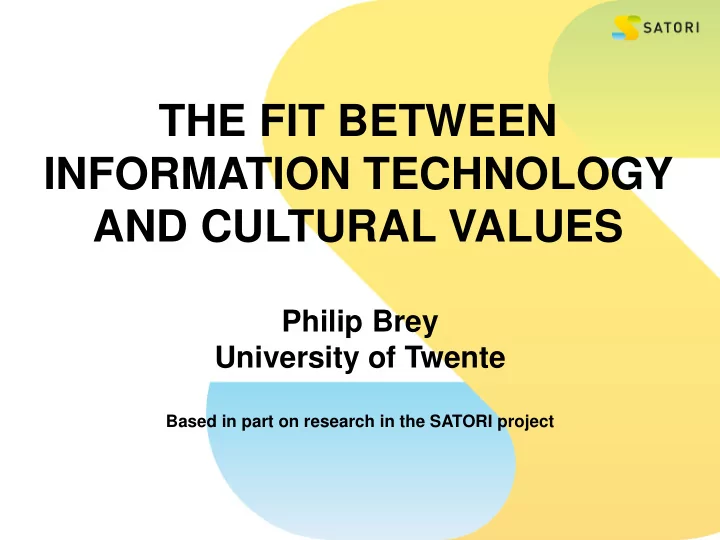

THE FIT BETWEEN INFORMATION TECHNOLOGY AND CULTURAL VALUES Philip Brey University of Twente Based in part on research in the SATORI project
1. Introduction The emergence of an information society, carried by ICT, has resulted in the field of information ethics Can we have a global information ethics that applies to all countries and cultures?
2. Wong’s Moral Relativism David Wong, Moral Relativity , University of California Press, 1984 Two major approaches to morality exist in the world: - virtue-centered morality (S and E Asia, Africa) emphasizes the good of the community - rights-centered morality (the West) stresses the value of individual freedom
Rights-centered moralities The Good is the individual good: what is good for individuals The goal of ethics is to respect the rights of individuals Individual rights include right to freedom, privacy, property, etc.
Virtue-centered moralities The Good is the common good : an ideal conception of community life, based on a well- balanced social order in which every member of the community has specific duties and virtues to promote the common good.
Virtue-centered moralities Individuals deserve respect only because of their perceived contribution to the common good, not because of inalienable individual rights Ethics is concerned with prescribing virtues and defining the common good
Some resulting differences Property: RCM recognizes individual property; VCM recognizes collective property but not individual property because sharing benefits the community Privacy: RCM recognizes privacy as an individual right. VCM does not, but recognizes distinction between collective private sphere and public sphere Freedom: RCM recognizes it as an individual right. VCM does not, but recognizes that restraints that keep individuals from fulfilling their role are unwanted.
Resulting differences for information ethics Nonwestern information ethics: more often recognizes information ethics as a collective good Less recognition of intellectual property rights Less recognition of informational privacy Less recognition of freedom of information Recognition of information sharing and of virtuous use of information for the collective good
3. The Inglehart-Welzel Cultural Map Inglehart and Welzel have created a values map based on their analysis of the World Values Survey. They position cultural values along two dimensions: 1. Traditional vs. secular-rational values 2. Survival vs. self-expression values
Traditional vs. secular-rational values Traditional values are values that emphasize the traditional institutions of religion, family and tribal structure, and the nation-state. They emphasise institutional obligations, absolute values and norms, and respect for authority. Secular-rational values emphasize secular, bureaucratic and rational considerations. There is openness and tolerance for alternative lifestyles and morals, and intolerance of authority.
Survival vs. self-expression values Survival values emphasise economic and physical security. They dominate in societies with high levels of economic scarcity and physical insecurity. They include an ethnocentric outlook and limited levels of tolerance and trust. Self-expression values take economic and physical security for granted, and focus on immaterial needs, such as life satisfaction, public expression, and liberty. They tend to include greater trust and social toleration.
Implications for Information Ethics Western information ethics has been developed in countries with strong self-expression values and moderate to strong secular-rational values. Countries with strong traditional values (Africa, Islamic countries, Latin America): - more limitations on freedom of information to protect traditional institutions and structures of authority - a greater online role of government and institutional religion
Implications for Information Ethics Countries with strong survival values (Africa, Islamic, Orthodox and Confucian countries): - more emphasis on security and less on privacy and individual liberties - information is for survival, less so for entertainment and self-expression Note that people in government may have different values from the general population (e.g., educated in Western countries), so their policies may be different than expected.
4. Conclusion A different information ethics may be needed for non-Western countries: - Virtue-based instead of rights-based morality - Greater emphasis on traditional and survival values However, many non-Western countries are becoming more Western in their value systems.
Also, many laws and policies in non-Western countries include Western values As information ethicists and legal scholars, we have to keep in mind the underlying value differences between cultures that are relevant for information ethics
Recommend
More recommend